 Petzlover
Petzlover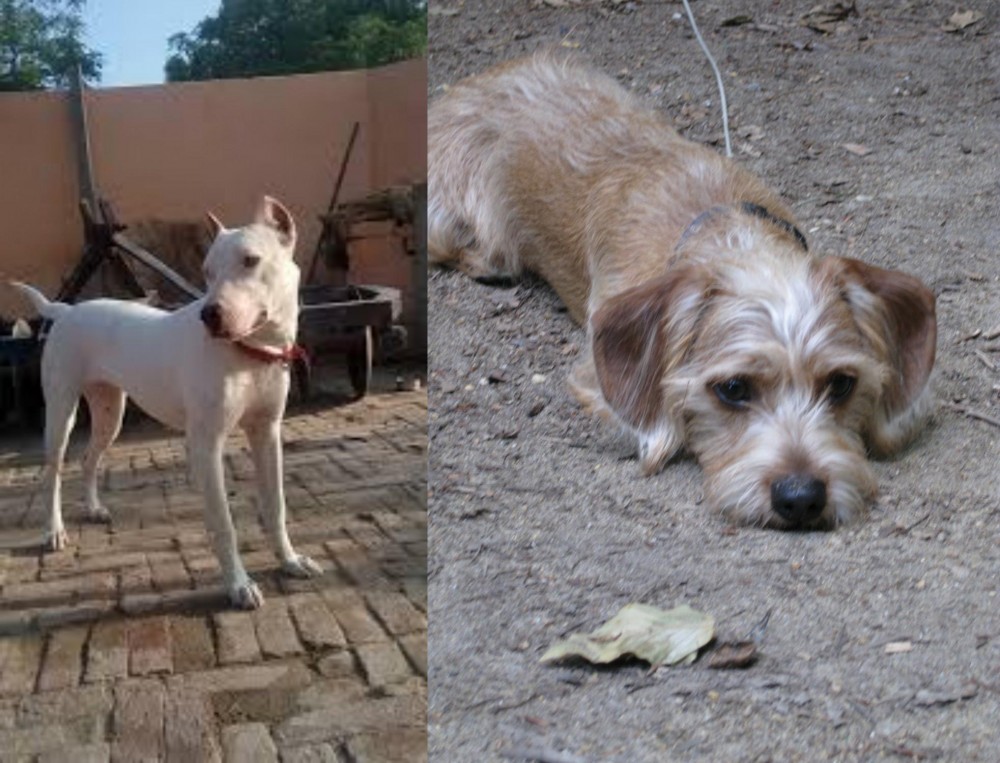 Both Indian Bull Terrier and Schweenie are originated from United Kingdom. Indian Bull Terrier may grow 6 cm / 3 inches higher than Schweenie. Indian Bull Terrier may weigh 21 kg / 47 pounds more than Schweenie. Both Indian Bull Terrier and Schweenie has almost same life span. Indian Bull Terrier may have more litter size than Schweenie. Both Indian Bull Terrier and Schweenie requires Low Maintenance.
Both Indian Bull Terrier and Schweenie are originated from United Kingdom. Indian Bull Terrier may grow 6 cm / 3 inches higher than Schweenie. Indian Bull Terrier may weigh 21 kg / 47 pounds more than Schweenie. Both Indian Bull Terrier and Schweenie has almost same life span. Indian Bull Terrier may have more litter size than Schweenie. Both Indian Bull Terrier and Schweenie requires Low Maintenance.
 Not much is known of the dog breed crossings that James Hinks carried out to get the Indian Bull Terrier. It is believed that he used the old English Bulldog, the English White Terrier and even the Dalmatian and Greyhound.
Not much is known of the dog breed crossings that James Hinks carried out to get the Indian Bull Terrier. It is believed that he used the old English Bulldog, the English White Terrier and even the Dalmatian and Greyhound.
The dog comes from the UK but was later introduced to India. The Indian Bull Terrier, known as the Indian gladiator was introduced to India by the British Colonial Forces. The dog was developed from British dogs, namely Irish and English strains of the Staffordshire Bull Terrier, the original English White Terrier and the Hinks Bullterrier breed. The legacy of Hinks is known worldwide – he is known as the one who mixed white terriers to bull dogs to make bull terriers. He made a breed that was the base breed of the egg shaped head bull terriers we see today.
The dog is similar in looks to the old type English Bullterrier. The dog has always been valued as a fighter and as a watchdog.
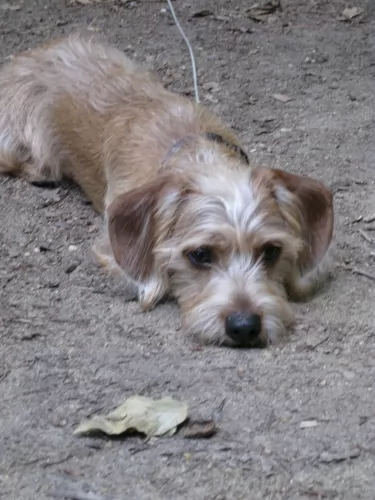 The Schweenie is a hybrid dog, with the parent breeds being the Shih Tzu and the Dachshund.
The Schweenie is a hybrid dog, with the parent breeds being the Shih Tzu and the Dachshund.
The Schweenie dog has been around for about 4 decades when breeders were looking for a dog that would be free of the health issues of the purebred parent breeds.
Because the Schweenie is a mix breed, it doesn’t qualify to be part of the American Kennel Club. He is however recognized by the Designer Breed Registry and some other clubs.
 The Indian Bully is a powerful, muscular, athletic and aggressive breed. He is a medium sized dog standing at roughly 46 cm to 56cm and weighs in the region of 20 – 30kg, both male and female.
The Indian Bully is a powerful, muscular, athletic and aggressive breed. He is a medium sized dog standing at roughly 46 cm to 56cm and weighs in the region of 20 – 30kg, both male and female.
As a Molosser, he has a strong, lean body with fairly long legs. Because of the white coat, quite a lot of them are born deaf and they also have skin allergies. The coat of the Indian Bull Terrier is short and smooth and nearly always white although you may well find some small dark markings on the coat. While solid white is the more common color, tan, red-brown and brindle can also be seen. He has the traditional egg-shaped head, erect ears, slanted eyes and long tail.
Your robust Indian Bull Terrier is a fearless dog, and where he has always been used for fighting in India and Pakistan, they are seeing the value of owning him as a pet too.
He is a loving, devoted pet, regarded as a bit of a clown. He is active and intelligent and apart from him wanting a lot of exercise, he just loves being with his human family, being involved with their hike, walks, ball games and swimming.
Being such a robust, active breed, he isn't suited to life in the city where the home is tiny and with little space to run. He is also strong-willed and maybe this characteristic of his might prove to be a bit of a handful for the first time dog owner.
He will need to receive early training and socialization, more so when there are children in the home. He can be inclined towards aggressiveness. They are capable of bonding with kids in the home but they can lean towards aggressiveness with other children.
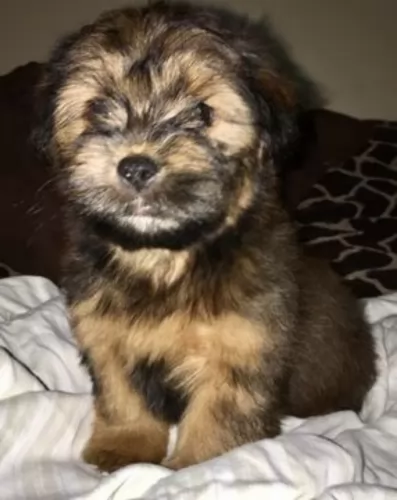 The Schweenie will be a smallish dog standing at roughly 27cm to 50cm and weighing 4 – 9kg.
The Schweenie will be a smallish dog standing at roughly 27cm to 50cm and weighing 4 – 9kg.
Because of the Dachshund parent, he will likely have a long body. The coat is shortish to medium length and can be a variety of colors – from a rusty color to brown, black, grey and even a cream shade. The ears are floppy and the tail medium length.
He is a small dog who is smart and bright and who wants to please his human owners. He loves people and wants to be around them and involved in their activities.
Small and cute though he is, he can be a stubborn dog and become a little big aggressive too if he is feeling a bit moody. He will need to be trained and socialized if you want him to obey your simple commands such as sit, stay, lie down and come.
He is intelligent enough to learn these simple commands with ease.He is both alert and vigilant, and this makes them good watchdogs.
 Indian Bull Terriers are affectionate, playful 4-legged family members. They are loyal, protective and social and will get on well with their own human family members but not necessarily with strangers.
Indian Bull Terriers are affectionate, playful 4-legged family members. They are loyal, protective and social and will get on well with their own human family members but not necessarily with strangers.
Precautions need to be taken around visitors who aren't familiar with the dog. He is powerful and energetic and must be trained and socialized to become the obedient, loving, loyal pet he is known to be.
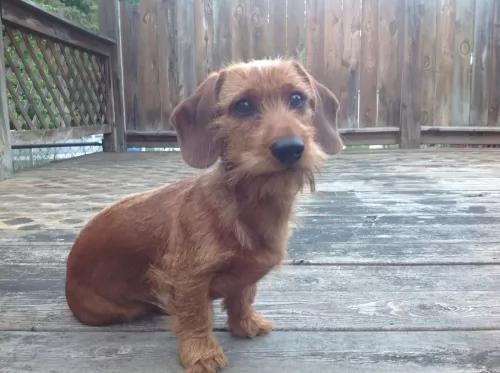 The Schweenie can be somewhat reserved and they need exercise regularly as well. If they don’t get enough exercise, they tend to become jittery and this can make them become a bit snappy. The are more prone to be snappy and aggressive with children who haven’t been taught how to treat animals gently and with respect.
The Schweenie can be somewhat reserved and they need exercise regularly as well. If they don’t get enough exercise, they tend to become jittery and this can make them become a bit snappy. The are more prone to be snappy and aggressive with children who haven’t been taught how to treat animals gently and with respect.
They’re small enough to adjust to life in the city or countryside but will still need to be exercised.
The little Schweenie, with the right kind of owner can become a great little pet and companion.
 With love and good care, your Indian Bull Terrier can reach up to 14 years of age and even more.
With love and good care, your Indian Bull Terrier can reach up to 14 years of age and even more.
If you own the white Indian Bull Terrier, you need to keep in mind that deafness is found in many white dogs. Another concern for your white dog is sun protection. Whether white or one of the other shades, your dog has short, sparse hair and spending hours in the sun can be hazardous to him and he can suffer with serious sunburn. Serious sunburn can lead to other complications such as cancer.
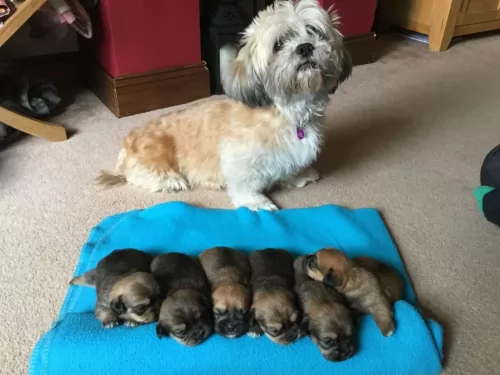 With good care, your Schweenie can live to be 12 to 15 years of age. Every dog, no matter how healthy, can get some of the health problems that plague many dogs.
With good care, your Schweenie can live to be 12 to 15 years of age. Every dog, no matter how healthy, can get some of the health problems that plague many dogs.
This is where the cushions between each vertebra come into contact with the spinal cord. It can result in nerve damage and sometimes even paralysis. Because the Shih Tzu is one of the parent breeds, you will need to be aware of this ailment as these dogs are more susceptible to this disease.
Hypoglycemia is fairly common in small dogs and it is where there is a drop in blood sugar. It can be brought on by stress. It can also be referred to as low blood sugar and it can be deadly. If your pet is hypoglycemic, you will notice a loss in appetite, extreme lethargy, trembling and unusual behavior. You will need to get your Schweenie to the vet immediately for tests and treatment.
 Your Indian Bull Terrier has a short coat and he doesn't thrive in cold, damp weather. When its really cold, keep him indoors or put a sweater on when he needs to go outdoors.
Your Indian Bull Terrier has a short coat and he doesn't thrive in cold, damp weather. When its really cold, keep him indoors or put a sweater on when he needs to go outdoors.
Give him a nice, warm, dry place to sleep and ensure that if he goes outside, there is both sun and shady spots for him to lie.
This is a low maintenance dog, so a twice-weekly brush will do him the world of good. It will get rid of loose hair, he will love the closeness the brushing provides and the brushing will keep his coat shiny and healthy.
If you have a white Indian Bull Terrier, if he has dirty marks on his coat, you can just wipe him down with a damp cloth.
Remember to do regular checks on his ears and teeth too. Tooth decay can bring on a host of illnesses for your pet.
If you are going to be giving your pet commercially manufactured dog food, make sure its the best there is.
Your Indian Bull Terrier is an active dog and you want to make sure that he remains healthy and active for the 10 to 14 years that he is with you. If you're unsure as to how to feed your pet, speak to your vet.
It will always be to your pets benefit to feed him some homemade food too and cooked chicken, brown rice and pasta and vegetables will keep his eyes bright and alert. If you can, try to add in some raw meat into his kibble too as this helps to keep his skin healthy. Never ever leave him without a constant supply of fresh, cool water.
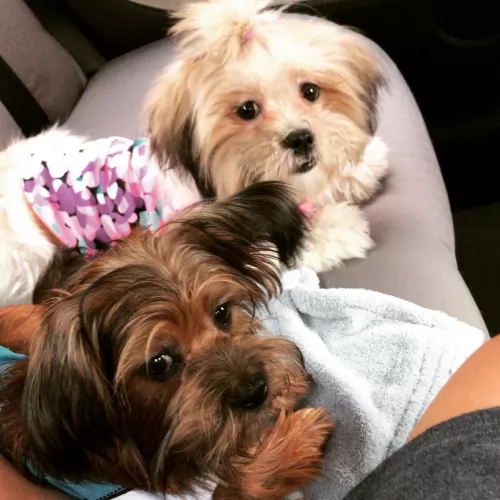 Your Schweenie will need to be brushed at least twice a week to rid him of loose hairs. Because of his floppy ears, you will need to clean them and check for redness. If you don’t like the idea of probing inside the ear, professional groomers or the vet will do it for you.
Your Schweenie will need to be brushed at least twice a week to rid him of loose hairs. Because of his floppy ears, you will need to clean them and check for redness. If you don’t like the idea of probing inside the ear, professional groomers or the vet will do it for you.
Trim his nails if they don’t wear down on their own.
Provide him with a nice dry, warm spot to sleep.
Provide him with nice chewy toys that will keep him occupied.
Exercise him every day. Taking him on walks and playing ball games with him will keep him fit and trim but also help with staving off boredom.
Ensure his vaccines against deadly diseases are up to date. See that he gets to the vet when he appears to be under the weather.
He is a small dog so you have to be careful about how you feed him. You need to feed him a nutrient-rich dry kibble. Read the packaging and buy dog food according to his size, age and activity levels.
Try and include some home-made food into your dogs diet. A little bit of boiled chicken, brown rice or pasta, sweet potatoes, carrots and spinach all chopped up will do him good and can be added into the dry kibble twice a week. Some raw meat should also occasionally be added in as this can help to prevent some skin problems. Be sure that cool, fresh water is available for your pet at all times.